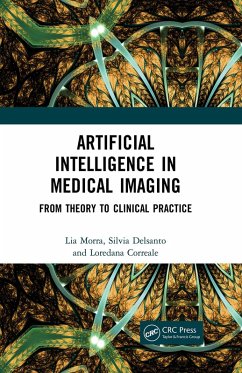
3D Printing in Radiation Oncology (eBook, PDF)
Personalization of Patient Treatment Through Digital Fabrication
Redaktion: Robar, James
Versandkostenfrei!
Sofort per Download lieferbar
52,95 €
inkl. MwSt.
Weitere Ausgaben:

PAYBACK Punkte
26 °P sammeln!
3D Printing in Radiation Oncology: Personalization of Patient Treatment Through Digital Fabrication presents a comprehensive and practical view of the many forms in which 3D printing is being integrated into radiation oncology practice. Radiation oncology employs among the most sophisticated digital technologies in medicine. Until recently, however, the "last mile" of treatment has required manually produced or generic devices for patient set up, positioning, control of surface dose, and delivery of brachytherapy treatment. 3D printing is already offering enhancements in both precision and eff...
3D Printing in Radiation Oncology: Personalization of Patient Treatment Through Digital Fabrication presents a comprehensive and practical view of the many forms in which 3D printing is being integrated into radiation oncology practice. Radiation oncology employs among the most sophisticated digital technologies in medicine. Until recently, however, the "last mile" of treatment has required manually produced or generic devices for patient set up, positioning, control of surface dose, and delivery of brachytherapy treatment. 3D printing is already offering enhancements in both precision and efficiency through the digital design and fabrication of patient photon and electron bolus, customized surface and gynecological brachytherapy applicators, proton beam compensators and range shifters, patient immobilization, novel radiation detectors, and phantoms. Various innovations are disrupting decades-old practices in radiation therapy (RT) facilities, resulting in vital improvements in personalization of treatment and patient experience.
An essential read for radiation oncologists, medical physicists, radiation therapists, oncology nurses, hospital administrators, engineers, and medical educators, this book is an indispensable resource for those bringing 3D printing to the RT clinic, looking to expand the role of 3D printing in their practice, or embarking upon related research and development.
An essential read for radiation oncologists, medical physicists, radiation therapists, oncology nurses, hospital administrators, engineers, and medical educators, this book is an indispensable resource for those bringing 3D printing to the RT clinic, looking to expand the role of 3D printing in their practice, or embarking upon related research and development.
Dieser Download kann aus rechtlichen Gründen nur mit Rechnungsadresse in A, B, BG, CY, CZ, D, DK, EW, E, FIN, F, GR, HR, H, IRL, I, LT, L, LR, M, NL, PL, P, R, S, SLO, SK ausgeliefert werden.













